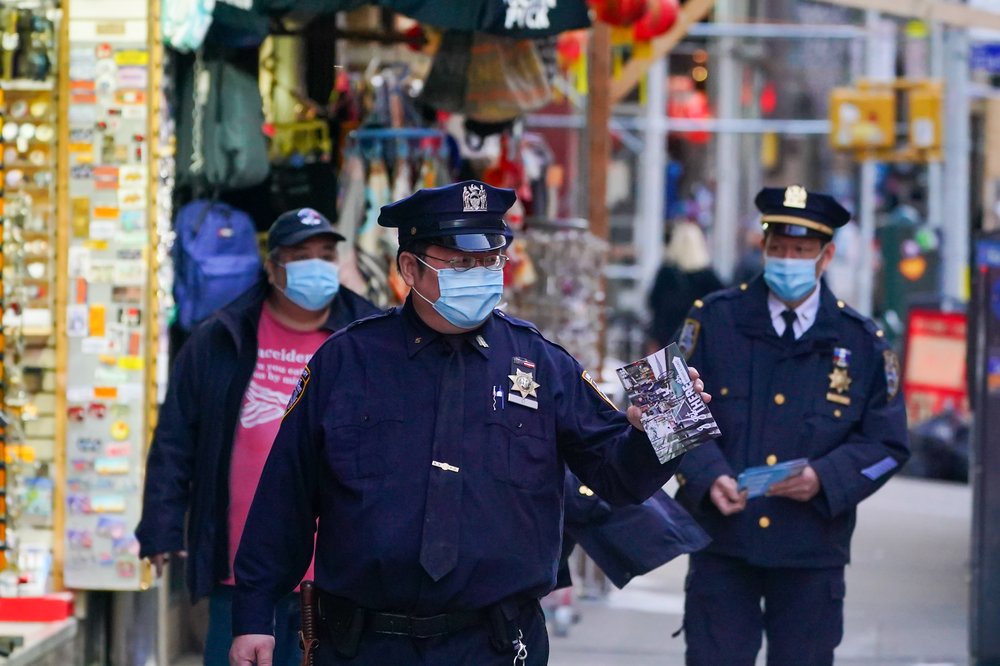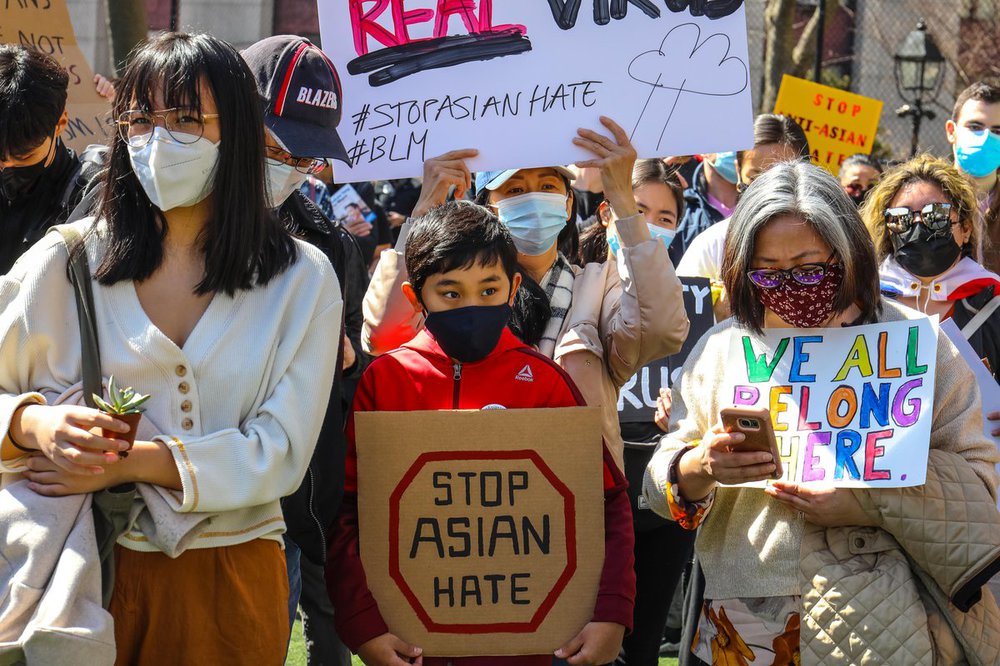The NYPD’s Method Of Counting Anti-Asian Attacks Underestimates Severity Of Crisis, Critics Say
April 12, 2021, 5:10 a.m.
As COVID-19 cases rose last year, so too did reports of attacks against Asian American New Yorkers. But police did not consistently tag them as racially motivated, and the NYPD to this day provides conflicting figures about the crisis.

The NYPD struggles to accurately identify, track and communicate data about anti-Asian hate crimes — sowing confusion among victims and potentially hindering the department's response to the crisis, a Gothamist/WNYC investigation has found.
As COVID-19 cases rose last year, so too did reports of attacks against Asian American New Yorkers. But police did not consistently tag them as racially motivated, and the NYPD to this day provides conflicting figures about the crisis.
“F–king Chinese coronavirus,” a teenager shouted at a 59-year-old man before allegedly kicking him in the back on Madison Avenue in March 2020.
“Where the f--k is your mask?! You f---ing Chinese!” raged a man accused of attacking a 47-year-old Asian man in front of his 10-year-old son that month.
Despite the racial invective, the NYPD didn’t treat either incident as an anti-Asian hate crime — instead, it classified them under a new “anti-COVID” category, which tracks attackers who allegedly believed their victims had COVID-19 at the time of the underlying crime. The NYPD says that with this category of offense the motive is really about the victim’s disability status, not race.
“That’s a poor choice — especially in light of what’s happened afterwards,” said Chris Kwok of the Asian-American Bar Association of New York, referring to mounting anti-Asian bias attacks in New York City and nationwide. “If it was an African American [victim] and COVID-19, I don’t think people would readily say ‘Oh, it’s about the disability.'"
Meanwhile, the number of anti-COVID reports this year has plummeted as the tally of anti-Asian crimes rose.
In the first three months of 2021, police tallied at least 31 anti-Asian crimes. Meanwhile, they’ve counted just three anti-COVID crimes, and of those three incidents, two had Asian victims, the NYPD said.
In 2020, the NYPD tallied just four anti-Asian hate crimes, according to department figures. Meanwhile, it logged 25 so-called anti-COVID crimes over the same period — 24 of which had Asian victims, a department spokesperson acknowledged to Gothamist/WNYC.
“They’re kind ofa erasing that [Asian] part,” said Kwok, who co-edited a February report titled “A Rising Tide of Hate and Violence against Asian Americans in New York During COVID-19: Impact, Causes, Solutions.”
When a noose is left outside a Black person’s home, or a swastika scrawled on a synagogue, police instinctively know that’s racial hate. But they don’t recognize that accusing an Asian New Yorker of “causing” Coronavirus is the same thing — and not some sidewalk diagnosis, according to Kwok.
"COVID 19 and being Chinese or being Asian became fused within people’s perception -- when Trump said 'China virus,' he was demonstrating how he was racializing that disease,” Kwok said. “If you were Asian, if you appeared to be Chinese, you were carrying it — you were it.”
The NYPD created an Asian Hate Crimes Task Force in August after months of rising bias attacks. But they could have begun addressing the issue sooner had they seen the early 2020 crimes for their underlying racial animus, Kwok said.
“If we don’t have the numbers to seriously address it, then we can’t begin to make those arguments for it,” he said.

Policing experts agreed that the NYPD misclassified the early 2020 incidents.
“These types of crimes are clearly directed at the Asian community and need to be coded as such by the police department,” said Dr. John Eterno, a retired NYPD captain and Director of Graduate Studies in Criminal Justice at Molloy College.
Sergeant Steven Lee, an active-duty officer of 16 years who is suing the department for retaliation over an unrelated matter, accused the NYPD of cooking the books.
“A lot of cops refuse to take proper reports,” Lee said, speaking as a private citizen.
“And they do that, because they’re pushed by the higher-ups, and the system refuses them to take these proper reports,” he added. “Because if there is an outbreak of this crime, and they’re made aware, then they have to do something about it. And they don't want to.”
In New York, a person commits a hate crime when they commit one of a specified set of crimes while also targeting a victim because of a perception or belief about their race, color, national origin, ancestry, gender, religion, religious practice, age, disability or sexual orientation. NYPD data shows officers filed just one report of an anti-Asian hate crime in all of 2019. The same year, the NYPD took 28 complaints of anti-White bias.
Eterno also accused the NYPD of downplaying the seriousness of some crimes.
“If something is political, they've manipulated their crime reports to focus on something that makes the police department look its best,” said Eterno, who co-authored “The Crime Numbers Game: Management by Manipulation.”
Yet, the NYPD touts itself as a leader in data-driven policing, and a rep said it considers all victims’ races when making policy — but it has struggled to accurately portray anti-Asian hate crime figures.
When the department announced on March 23rd that it would use undercover officers to stop anti-Asian attacks, it told NY1 and the Daily News that there had been no anti-Asian hate crimes in the first three months of 2020.
That overlooked at least seven anti-Asian attacks that the NYPD had counted as anti-COVID hate crimes for the period. The Daily News article was updated after Gothamist/WNYC showed it to the NYPD as an example of misinformation.
The head of the NYPD’s Hate Crimes Task Force repeated the low-ball figure two days later.
“At this time, we are actively investigating or have solved 12 anti-Asian bias assaults for this year, compared with none reported at this time last year,” Deputy Inspector Jessica Corey said during a March 25th briefing about the undercovers.
Asked moments later by a Gothamist/WNYC reporter whether Corey’s number of zero was accurate, NYPD Commissioner Dermot Shea blamed victims for not reporting crimes.
“I don’t think there’s any way that that’s an accurate number,” Shea said, apparently unaware of the irony. “It’s an underreporting of crimes.”
He added that “We had an increase in corona-related last year,” but did not explain that he was referring to crimes with Asian victims, and Corey’s comments about zero year-to-date hate crimes in 2020 were widely reported in the media.
Even outlets that noted the anti-Covid crimes cited varying numbers from the NYPD.
An NYPD spokesperson told Gothamist/WNYC that officials didn’t make the distinction more clear at the press conference because no one asked.
Shea added that the NYPD would encourage victims to come forward using brochures and outreach by police fraternal organizations.
Kwok acknowledged that the Asian community is learning in “real time” to overcome a cultural hesitancy about reporting crimes — but said police must take seriously the incidents that are reported.
“It’s too easy for [NYPD] to put that ball into the community's court and say, ‘You need to report.’ They’ve been reporting. It’s on [NYPD] to do something serious and engage with what has been reported,” Kwok said.
Sergeant Lee’s attorney, retired 15-year NYPD veteran Joe Murray, accused the department of “purposely exploiting the fact that the Asian community does not come forward on their own and hiding from that.”
An NYPD spokesperson acknowledged the incidents were anti-Asian and also anti-COVID, but said that officers believe that anti-COVID was the stronger motive, and the department stands by its classification. The department would not count the crimes as both anti-Asian and anti-COVID, because that creates the appearance of more crime, the spokesperson said.
“If the statistics are inaccurate, the tactics that follow will also be inaccurate,” said Eterno. “So they need that accurate data, and they're actually hurting their crime-fighting efforts by classifying crimes in this way.”
Eterno, Lee, and Murray said there was little value in tracking anti-COVID bias, and much more value in counting anti-Asian hate, which predates the pandemic and will almost certainly outlast it.
For more, listen to reporter Max Jaeger discuss this story with Morning Edition host Michael Hill on WNYC: